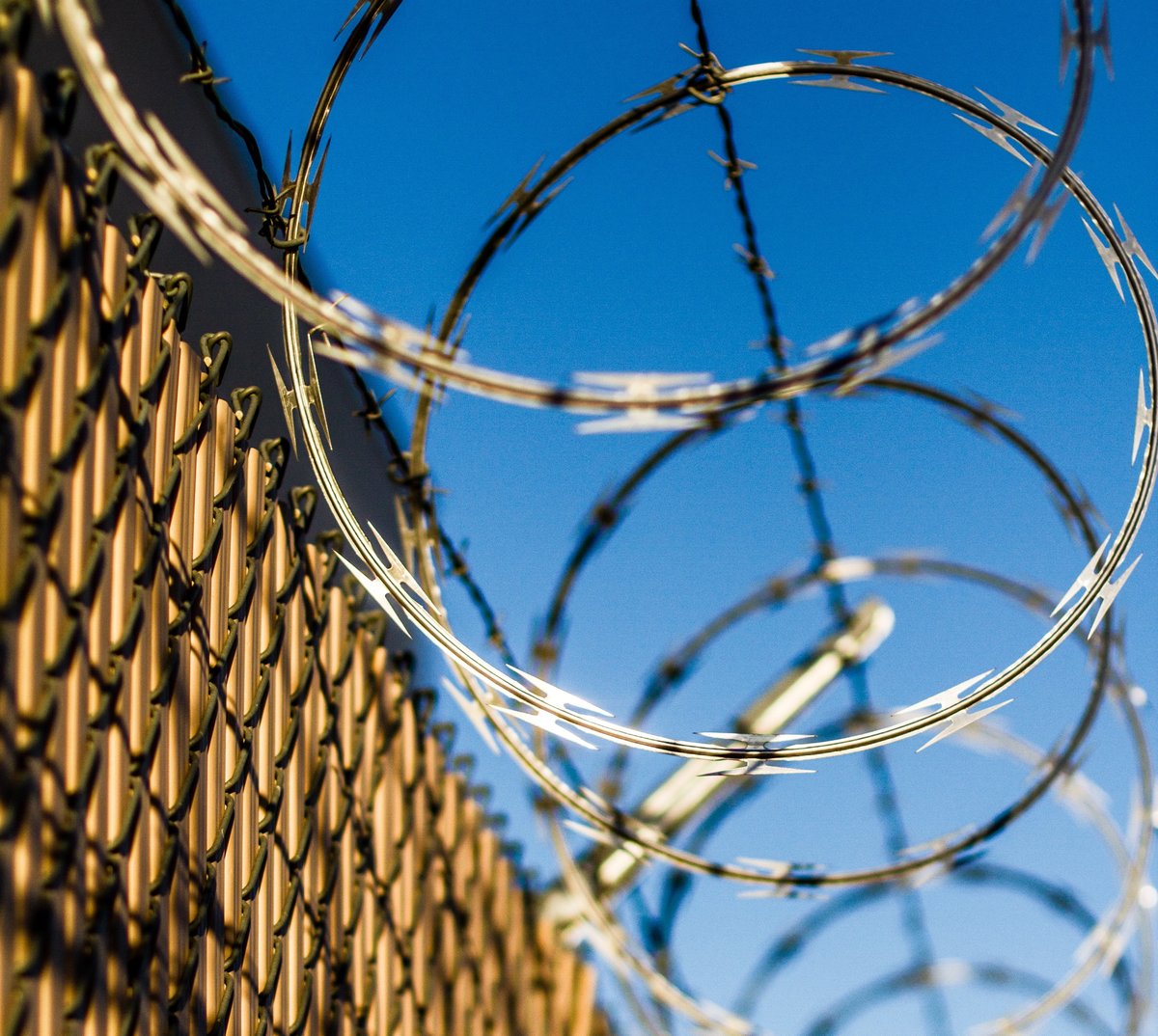‘Care + custody’ the sign for the Heathrow Immigration Removal Centre (IRC) declares cheerily, in a bubble font suited to a primary school classroom. It is surrounded by a jolly purple splash of colour. The sign is framed by large wire fences in the background, surrounding large orange buildings with clinical square windows set at dreary intervals.
The help desk takes fingerprints, passport details, and displays large signs warning visitors of the penalties for smuggling in drugs. A small TV blares out Jeremy Kyle and the shopping channel. The receptionist smiles at me welcomingly. ‘Here is your pass love’, she says. I smile back.
My male colleagues are taken into a room together and patted down. While I wait I look at the art displayed in the waiting room – colourful paintings of gardens, odd little statues. One painting is of the IRC, in a burst of orange and red, with planes taking off in the background. I cannot work out if it is meant to be positive. The planes take centre stage and the style seems bleak and aggressive – but the IRC has put it in the waiting room, I must be interpreting it wrong? We wait for a female member of staff to appear. She takes me into a room separately and gently searches me. She chats merrily about her recent holiday abroad. She shows me her magnificently manicured nails, which I duly praise. ‘These are a real pain with the rubber gloves’, she burbles.
Then she takes us through the endless sets of locked doors to the welfare room. She continues to talk about her holiday. The staff we pass call back to her, asking her for details. She gives them the low down on the amazing food she had, while she turns the locks in the doors. As they slam behind us, we hear about the sun, the hotel, the pool.

There are photos all around the IRC of people engaging in group activities. They look happy. They are dressed in colourful clothes and have perfect teeth. Some of them appear to be frolicking in flowery fields. Once in welfare, we are show to a round table where we will meet over 15 clients that day. The room feels tense. There are about 10 men in the room, some pacing around, some lounging on the sofas, some staring anxiously at the fax machine. A brief altercation breaks out. We take our seats carefully and the first clients start to approach. ‘If you put your mind to it, you can achieve it’. This motivational phrase plastered on a poster on the wall looms over the consultation table. I point this out to my colleagues quietly. A raised eyebrow, then the consultations begin.
Two hours later, we are bundled out again for lunch. Back through the doors. The same friendly guard takes us out. We walk away from the barbed wires, from the locked doors, from the search room, from the tension. We have a brief discussion about where to go – McDonalds, or the hotel? We go and sit in the nearby hotel. It is impressive. High ceilings, huge sofas, wide backed chairs, low coffee tables. The staff smile at us.
We return for 2pm. Back through the doors, the barbed wires, the search room, and into the tension. The Home Office representative has appeared in the welfare room and there is lots of shouting. A man wants to leave, he is asking to return to his country of origin, and the Home Office will not allow him to do so. We see more clients. Advice is given, documents exchanged, stories shared, tears shed.
We bundle up our papers and leave. I take another look at that poster. ‘If you put your mind to it, you can achieve it’. I decide that I have never read anything more depressing. As we walk out of the centre, we discuss the issues with the new accommodation provision (‘schedule 10’). The guard joins in – ‘bring back section 4 accommodation, I say. The new system is a mess!’ she laughs. We walk back to the tube.
As I sit on the long tube journey home, I ruminate on the experience. I had expected to feel a lot of emotions on my first visit to a detention centre. Sorrow. Anger. Empathy. Worry. But I had not expected to feel quite so ashamed.
Ashamed of a system which is so cruel, so shocking, so racist, so ruthless, that the system itself cannot bear to face what it is. A system which needs to tell itself that the IRC system is about ‘care’. A system which needs to tell itself that a tragic painting of an IRC, which so clearly depicts the desperation of a detainee who was consumed by fear of deportation, was happy artistic expression. A system which can place a hotel with grand sofas and smooth jazz just metres away from an IRC. A system which needs to tell itself that detainees are in the position they find themselves in because, well, they just did not try hard enough.

This is a system which is unable to acknowledge its own cruelty and violence. It pretends it is respectable. It pretends it is humane. It pretends it is based on some kind of moral judgement of detainees, rather than being a system perpetrating oppression. That is why the work BiD does is so vital. Not only does BiD help to get detainees bail, a vital lifeline to some of the most vulnerable in our society. BiD also calls out the system for what it is. We need to fight the pernicious and calculated attempts to normalize, humanize, and legitimise immigration detention.
For all the posters, the art work, the photos, the friendly guards, I still saw 15 men that day whose stories laid to rest any attempt to justify or explain this system. Men who were separated from partners, from children, from relatives. Men who were terrified about their future. Men who had no idea when they would be released. Men whose health was rapidly deteriorating. Men whose basic dignity had been unforgivably breached. Men who I doubt most British citizens could look square in the eye and tell them that they felt OK with what was being inflicted on them. We need to show wider society the truth of immigration detention, and the truth of those who are subjected to its violence. BID tries to do this every day, and in doing so we edge ever closer to exposing and thus dismantling a system of which we should all be deeply ashamed.
If you are interested in finding out more about volunteering with BID, visit our volunteering page.





